From oceans, forests, to climate change, these young changemakers are helping save the planet
Meet the young change makers from different parts of India working towards saving the environment. They have been featured in One For Change, a series of short films to be aired on National Geographic on Earth Day.
Young people across the world are becoming important drivers of climate change. They are conservationists, climate activists, and social entrepreneurs passionate about making the earth a better planet to live in.
Fifteen-year-old Bodhisatva Khanderao from Yavatmal district in Maharashtra has increased around 80% of forest cover in his area with a simple solution–Magic Socks.
Similarly, nine-year-old Thaaragai Aarathana is collecting discarded plastic on the beaches of Chennai and has so far scooped up 800 kg of waste.
At 17, Haaziq Kazi is effecting change with ERVIS ship–a prototype ocean cleaner ship capable of sucking out plastic from the ocean’s surface, which he designed when he was in Grade IV.
A precocious 10-year-old from Chengalpattu in Tamil Nadu, Prasiddhi Singh founded the Prasiddhi Forest, and is the youngest fruit forest creator in the country.
When she was just 11, Ridhima Pandey joined Greta Thunberg and other child climate activists to protest the lax attitude of governments towards climate change at the UN Climate Action Summit. And, at 16 Ankith Suhas Rao presented the Global Youth Manifesto, a call for action against climate change at the COP27 in Egypt last year.
What connects these six young changemakers apart from their causes is that they feature in Change for One, a series of short films, released on April 22, Earth Day.
SocialStory spoke to these young changemakers to understand more about their initiatives. Here are their stories of action and change.
Bodhisatva Khanderao, Yavatmal, Maharashtra
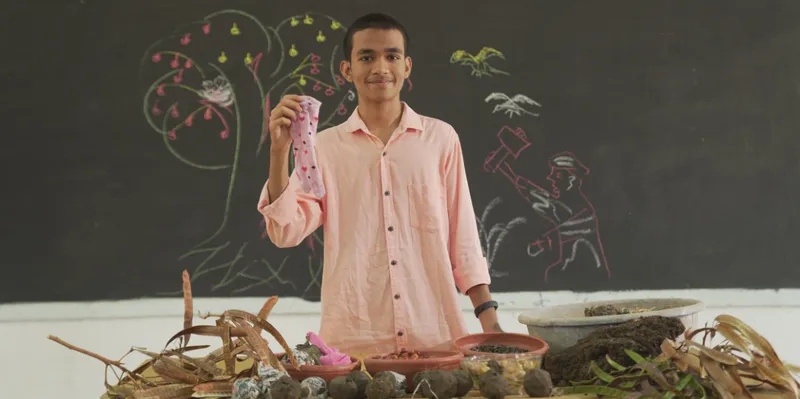
Bodhisatva is helping increase green cover with the Magic Socks Method
When he was just six-years-old, Khanderao saw his first forest fire. Over the course of time, he saw trees being cut and the forest cover slowly depleting.
“As a curious young boy, I asked my mother what would happen if the forests vanished. She laughed and said, ‘we cannot stop people from cutting down trees, but we can plant more trees’,” he says.
Yavatamal lies in Maharashtra’s Vidarbha region that has been besieged by constant droughts leading to farmer suicides.
This laid the foundation for Khanderao’s call for action–save the environment by planting as many trees as you can.
Taking off on his mother’s seedballs project where he would accompany her to collect seeds of fruits and vegetables from households in the area, Khanderao put his own unique spin on it.
He started the Magic Socks project and introduced it to schools nearby. All one needed were old socks that could be filled with a little dry soil, seeds, and compost, tied up and flung in different places. When drops of water touched the socks, the seeds would germinate.
“I would go around with my schoolmates and distribute these magic socks just before the monsoon,” he says. The aim was to populate the surroundings with indigenous trees such as chikoo, custard apple, mango, and medicinal plants.
Khanderao works with different NGOs in the state to distribute these Magic Socks and raise awareness in different forums on preserving and enhancing the green cover.
Ridhima Pandey, Haridwar
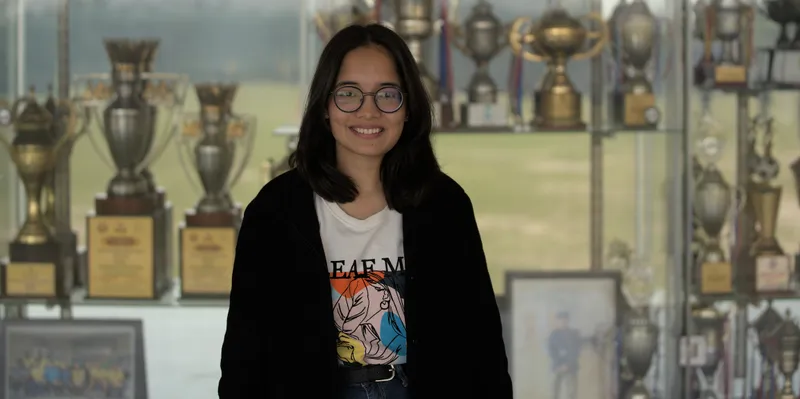
Ridhima Pandey joined 15 other young petitioners, including Greta Thunberg, to file a legal complaint against the United Nations Committee on the Rights of the Child for its inaction on climate change.
Though she was only five years old at the time, Pandey vividly remembers the fear and anxiety surrounding the flash floods at Kedarnath in 2013.
She recalls, “Both my parents are wildlife conservations and had rushed there to rescue the animals. I remember seeing the destruction on television, my mum explaining what flash floods were, and being very affected by it.”
“I started having nightmares after a while, and whenever there was thunder or heavy rain, I would be very scared. I had the fear that I would die or lose my parents,” she adds.
Young Pandey had a simple question for her parents--what could she do to stop flash floods from occurring. They introduced her to the effects of human emissions and global warming. This information empowered her to learn more about the need for environmental conservation.
At nine, Pandey filed a petition against the Indian government at the National Green Tribunal for not addressing climate change. The petition was recently rejected and the case has now been moved to the Supreme Court. Pandey continued to follow a “green and sustainable lifestyle”, working on reducing her carbon footprint and educating herself on how children can fight against climate change.
In 2019, she joined 15 other young petitioners, include Greta Thunberg, to file a legal complaint against the United Nations Committee on the Rights of the Child for its inaction on climate change.
“Since then, I have been working on different projects with organisations on air and water pollution and on development initiatives. I speak to students in schools and colleges on how their actions are impacting the climate crisis and what kind of eco-friendly practices they can follow in everyday life,” she says.
Prasiddhi Singh, Chengalpattu
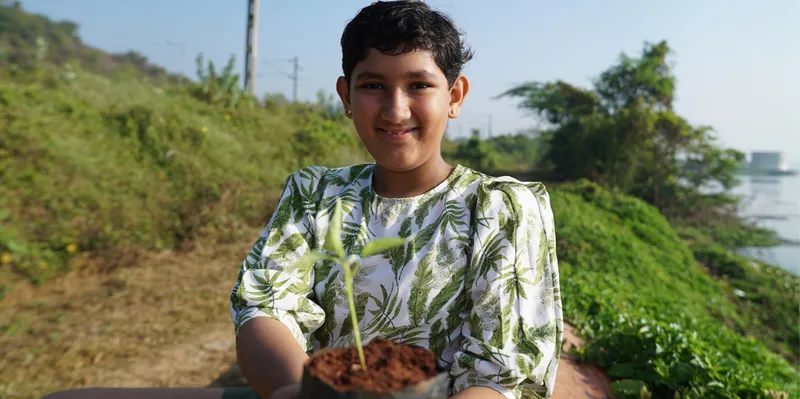
10-year-old Prasiddhi became the youngest awardee of the Pradhan Mantri Rashtriya Bal Puraskar
At 10 years, Singh is an environmentalist and social entrepreneur. A winner of the Prime Minister’s Bal Puraskar Award, this young girl from Chengalpattu has helped in planting over one lakh trees so far. She is also educating people on the need to preserve the environment for her generation and those after her.
She’s as articulate as she is excited about the work she’s doing.
“Nature has been my biggest source of inspiration. From the time I learned to walk, the rustling of leaves, the buzzing of bees, the waves of the sea have inspired me,” she says.
Singh was four years old when Cyclone Wardha hit the coast of Tamil Nadu. Though too young to understand the effects of destruction and havoc, she remembers animals and birds in fear and a feeling of gloom all around.
She started participating in multiple community tree plantation drives, and launched the Prasiddhi Forest Foundation at the age of six. A registered NGO, the foundation has connected with more than 40,000 people and has mobilised individuals through more than 600 awareness sessions and workshops. A two-time TEDx speaker, Prasiddhi is the brand ambassador for the Beti Bacho, Beti Padhao campaign and the Child Ambassador of the Tamil Nadu Green Mission.
“I have two missions through my foundation--to plant trees to increase biodiversity, and bring people together through continuous awareness,” she adds.
Singh works with a group of volunteers who support her in various activities.
Ankith Suhas Rao, Hyderabad
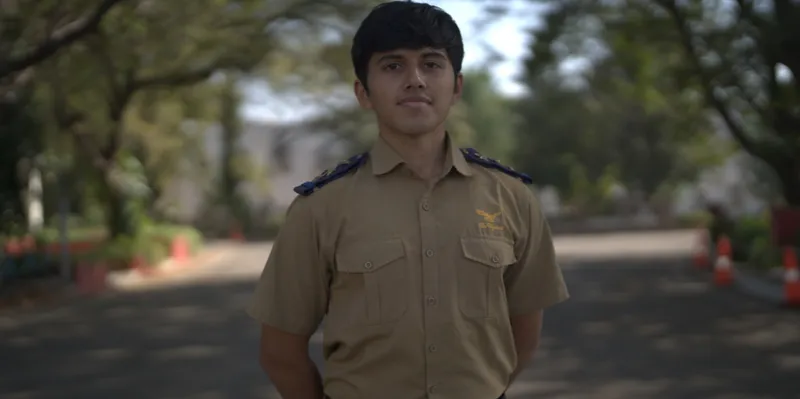
Ankith was a young speaker at COP 27 summit in Egypt last year.
Growing up in Hyderabad, Rao realised that even urban cities are teeming with wildlife.
“As a nature and wildlife enthusiast, I have recorded sounds of 15 different species of birds that visit my home during different seasons. This, coupled with visits to wildlife and nature parks, fuelled my curiosity for the environment,” he says.
When he was in the eighth grade, Rao joined the #decarbonise team at school, launched by the Centre for Global Education of Canada that allows students below 18 years to deliberate on climate change and present their findings to the world.
“We were able to interact with students from all over the world that increased our understanding and perspective on various issues and solutions, and also implement sustainable practices within our school, neighbourhood, and community,” Rao says.
The students organised cleanliness drives on campus, held rallies in the neighbourhood to raise awareness, and organised art exhibitions on climate action and posted important information through blogposts.
Rao represented India at the COP27 conference in Egypt last year where, along with his #Carbonize teammates, presented the Global Youth Manifesto with a bunch of ideas they wanted policy makers to implement so that the voices of children could be heard on a global scale.
“There should be inter-generational dialogue between youth, children, and others with policymakers to understand what kind of initiatives can be introduced on a larger scale,” he says.
Haaziq Kazi, Connecticut
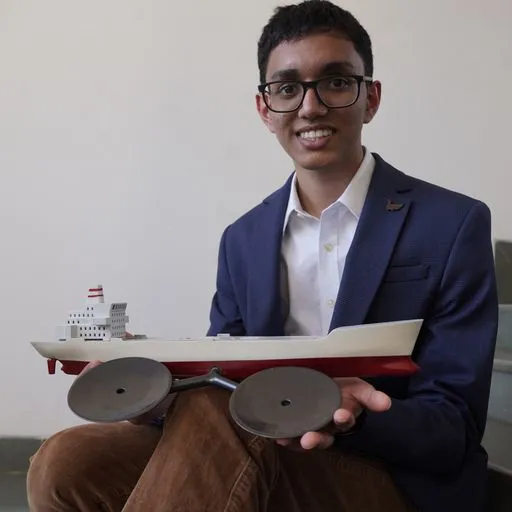
Haaziq Kazi developed ERVIS, a prototype of an ocean cleaner ship capable of sucking out plastic from the ocean’s surface.
When Kazi was studying in the fourth grade at the Indus International School in Pune, he came up with the idea of ‘ERVIS’, a prototype ocean cleaner ship capable of sucking out plastic from the ocean’s surface.
From a young age, he had been watching documentaries about plastic pollution and says he wanted to do something about it.
“Did you know a million birds, and 100,000 marine creatures die every year just by ingesting plastic. And, what’s worse is how they die–the plastic they ingest fills up the stomach, and they die of starvation,” he says.
Plastic, he realised, was going to be a perennial problem unless there was a change in lifestyle, because as he rightly points out, we clean the plastic and then we throw it all back.
Kazi started the ERVIS Foundation to bring generational change in the way youth deals and interacts with plastic and marine ecosystems.
Currently, a Grade XI student at the Hotchkiss School in Connecticut in the US, Kazi is a vocal proponent of circular economy and engages in creating multiple viable solutions on elevating inefficiencies in the current consumption of plastic at the macro level. He has spoken at various TEDx events.
Kazi’s mentor is Dr Ash Pachauri, Senior Mentor of POP (Protect our Planet) movement.
“I am currently working on a model that predicts the movement of plastic in water bodies. This project combines my love for both computer science and the environment,” he says.
Another pet project is research on the impact of Sargassum (large brown seaweed) on local communities in and near Cancun in Mexico.
“I think we need more young people in climate action as we are going to inherit this planet. If we don’t attempt to make a change, it will never happen,” he says.
Thaaragai Aarathana, Chennai
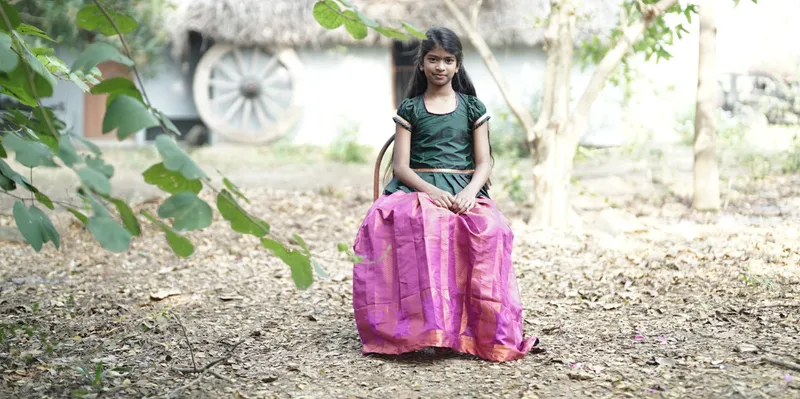
Thaaragai swam a 19km stretch under the theme 'Save the Ocean' to create awareness about endangered marine species and depleting aquatic life.
In January 2021, at the tender age of eight, Thaaragai Aarathana swam 19 km from Covelong to Neelankari under the ‘Save the Ocean’ to drawn attention to threat to marine life due to the rampant dumping of waste into the ocean.
Aarathana’s father Aravind is a scuba diving instructor and runs his own diving centre.
“From a very young age, I would see my father pick up plastic from the ocean and when I asked him why, he explained how it could affect marine life,” says Aarathana.
When she expressed a desire to join in, he educated her on the need to keep her home and surroundings clean first, and when she got older, she could join him.
Aarathana did not have to wait long. Her father started introducing her to the ocean, starting with three sessions a week. She had started swimming when she was just six-months-old.
During the 19 km long swim, Aarathana recollects having to wait until the inclement weather to clear. “We were supposed to start at 6 am but it started raining heavily. Once I was in the water, I also got cramps and my face was covered with jellyfish,” she says.
With her father swimming beside her, and a team following them, she was able to complete the stretch.
“This act got me a lot of media attention. I was not doing it to break any record but highlight the effects of ocean pollution. People began taking interest in it,” she says.
So far, the duo has collected 800 kg of plastic from the ocean. Aarathana visits schools and colleges regularly to give talks on the dangerous effects of plastic pollution and how we can collectively save marine life.
This year, they plan to cover the Neelankari-Marina stretch, and going forward, cover the entire east and west coast.
“I want to become a scuba diving instructor like my father when I grow up,” Aarathana says.
(This story has been updated with a change in name of series from One For Change 2.0 to One for Change.)
Edited by Megha Reddy






